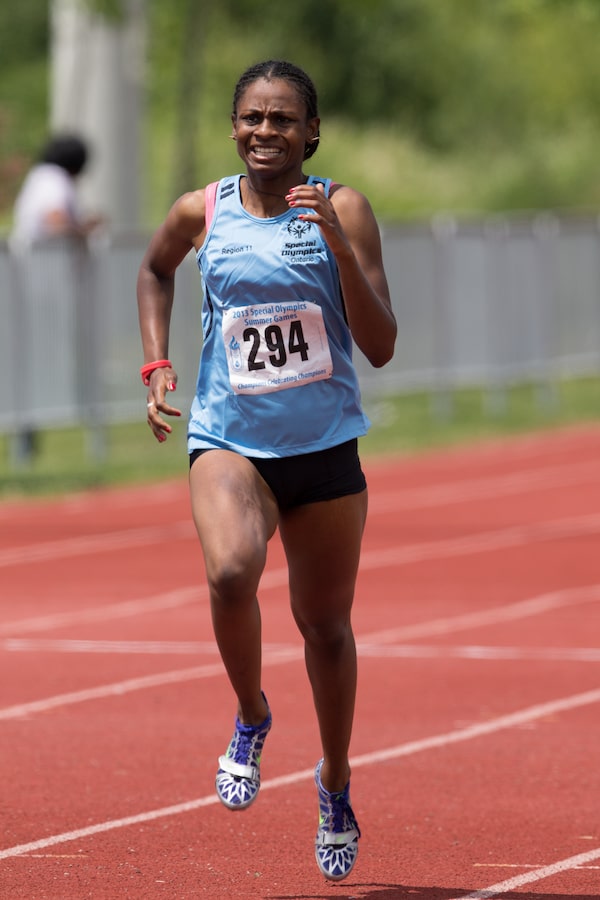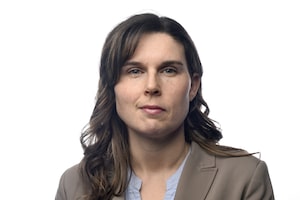
The team-of-the-year award went to the Humboldt Broncos Special Olympics floor hockey team.KEN DUMONT/Handout
Special Olympics uses inclusive sport to enrich the lives of people with intellectual disabilities, but that mission has been exceedingly challenging in 2020.
The Canadian chapter of this international movement includes 49,600 athletes from the age of 2 to mature adulthood, and 22,000 volunteers. They have faced cancelled competitions and limited training since March, which has cost many athletes a precious source of friendships, independence, exercise and mental well-being.
The Canadian chapter celebrated its athletes Thursday night at the Special Olympics Canada National Awards – fittingly held on International Day of Persons with Disabilities. What is usually a fun annual night out was instead a virtual ceremony that brought together athletes and organizers from all 12 provincial and territorial chapters.
“We all need this night, and the shot of positivity and inspiration,” said Sharon Bollenbach, chief executive officer of Special Olympics Canada. “While we can’t be together, I think the importance of it, and what the awards night stands for, is even more important this year.”
Monique Shah, a 40-year-old participant in multiple Special Olympics sports, was chosen female athlete of the year. She leaned excitedly into the screen during a video interview with The Globe and Mail in the days before the ceremony, as four medals worn proudly around her neck clanged loudly.

Monique Shah, a 40-year-old participant in multiple Special Olympics sports, was chosen as female athlete of the year.Handout
That was the same beautiful noise made by those heavy medals earned in snowshoe racing when she wore them on the plane home from the Special Olympics Canada Winter Games in Thunder Bay last winter, her last big competition before the COVID-19 pandemic put her great passion on hold.
Shah’s family planned to watch the virtual ceremony at their home in Bradford, Ont., after a celebratory dinner with cake. Winners received their awards by mail, along with treats such as snacks and gift cards to help them celebrate at home.
Shah proudly held up her framed award during the interview, and a photo calendar full of memories from her 23 years in Special Olympics. She has participated in many sports, including bowling, bocce, snowshoeing, soccer and track and field – her specialty at the 2011 Special Olympics World Summer Games in Athens, Greece. She has made countless friends, participated in torch runs and was invited to meet former prime minister Stephen Harper in Ottawa.
“I don’t have any more space in my room for all my medals,” Shah said.
Before the pandemic, her week was filled with programs. While she can still do some small-group track and field training at York University, she misses team training and helping the athletes just starting out. Her mother misses the friendships and support that comes from being around other Special Olympics families.
Shah sometimes needs a parent to help with some of the virtual programs offered to the athletes, such as yoga, sessions on health and nutrition and Friday morning social meetings.
“That socialization is so important to her,” her mom said. “Special Olympics has been a kind of wind beneath Monique’s wings.”
Shah’s friend Nerissa Pooran from Thornhill, Ont., was also honoured Thursday, with the Dr. Frank Hayden Lifetime Achievement Award. Pooran, 40, has been participating for 32 years, mostly in track and field and swimming.
Nerissa Pooran, pictured here on June 4, 2018, has been competing in both track and field and swimming with the Special Olympics for almost 30 years.Glenn Lowson/For The Globe and Mail
Pooran’s whole family is involved in volunteering at Special Olympics events, from fundraising to timekeeping and co-ordinating meets. They even run a track event in memory of her sister Natalie, who was a Special Olympics athlete before she died from a stomach tumour in 2012. Their summers are typically busy with athletics meets, but this year’s was quiet. They faced pool closures, too.
“Special Olympics has become a way of life for us,” her mother, Zita Pooran, said, with her daughter seated beside her for a video interview. “Some athletes might develop a new skill within a couple of months, but it may take Nerissa a whole season, a year, two years to learn a skill because of the ongoing challenges she faces. But she has thrived in Special Olympics, and our family has learned so much being around people of all abilities.”
Pooran’s lengthy sporting career also includes being added to the Wall of Fame at Variety Village – a sports facility in Toronto – and becoming the first Special Olympics athlete inducted into the Toronto Sport Hall of Honour.
Pooran needs parental tech support to do video calls. While she speaks only a few words during the interview with The Globe, her mother says she’s often quite talkative with friends and competitors, and the Friday morning virtual social meetings of Special Olympians often become dance parties.

The Humboldt Broncos Special Olympics floor hockey team have been together for some 16 years and share a long-standing friendship with the junior hockey team of the same name.Handout
The team-of-the-year award went to the Humboldt Broncos Special Olympics floor hockey team – a group of players who have been together for some 16 years. They share a long-standing friendship with the junior hockey team of the same name, which lost several of their players in the tragic 2018 bus accident.
In recent years, the floor hockey Special Olympics athletes travelled out of province together for the first time – first to Toronto, then to nationals in Thunder Bay, where they earned a bronze medal just days before the shutdown in March.
“For some of our players, it was their first time on a plane or the first time away from family and friends for several days at a time,” said their coach, Brian Reifferscheid, who volunteers in a few sports. “Sports is a big part of their lives and the group is pretty close. They also bowl, they play indoor soccer, bocce and softball in the summers.”
But with programming interrupted by the pandemic, the group hasn’t been able to gather. They cancelled the team celebration they had planned after Thunder Bay, and the Special Olympics Humboldt banquet – an annual night of awards, food and dance – was wiped out, too.
“We went from going a 100 miles an hour to nothing at all,” Reifferscheid said.
Reifferscheid said checking in on his athletes during the pandemic is challenging. Few of them have cellphones and it can be complicated to track down some who have moved back with parents or live in group homes.
The floor hockey team’s leading scorer, Dwayne Anderson, 38, said he communicates a little with teammates on Facebook. He lives on his own and tries to stay connected to Special Olympics by participating in virtual nutrition classes. His exercise comes from walking on his newspaper route.
He said it was hard to make friends as a kid, and he was bullied because of his intellectual disability. He told a story of boys beating him up in the gym change room. Another time, bullies threw his clothing in the toilet. The phys-ed teacher eventually gave Anderson his office so he could change alone.
When asked during a phone interview what being part of the Broncos has meant to his life, he said, “Well, I’ve actually made friends. Most of my closest friends are on the team.”
He said he’s learning to bake his food now instead of pan-frying it, and he has cut down on sugary foods and soft drinks.
“Now if only this damn COVID virus would go away,” Anderson said.
The award for male athlete of the year went to Matthew Williams in Langley, B.C. A Special Olympics athlete for the past 15 years, the 28-year-old has competed in basketball, floor hockey, swimming, athletics and curling, although today he focuses on speed skating and golf.

Matthew Williams says he began in a generic hockey program as a young boy, but quit when he had a tough time comprehending the skills and rules.Handout
He says he began in a generic hockey program as young boy, but quit when he had a tough time comprehending the skills and rules at the same rate as many other kids. Because his disability wasn’t obvious to others, they couldn’t understand why he needed to learn things in a different way.
“I was really thankful that my first year of high school when I was 13 I found Special Olympics because it really helped reignite the love and passion for sports,” Williams said in a video interview. “It really helped me deal with all the difficulties I had in my life, and it was a place where I felt accepted.”
Williams has since represented Special Olympics Team BC at six National Games and Special Olympics Team Canada at two World Games. He developed his public speaking and delivered a TED Talk. He has been an athlete representative on several boards – in B.C. and internationally.
“I try to make sure that Special Olympics athletes voices are part of the movement,” Williams said. “And that their ideas are heard.”
 Rachel Brady
Rachel Brady